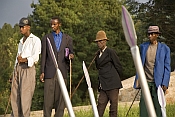
Christine Stansell in The New Republic this week published a very powerful essay on Rwanda – The Aftermath and After.
The foundation of the article is built on a review of The Strategy of Antelopes by Jean Hatzfeld (published in the UK by Serpent’s Tail). It is a sequel to 2 of his earlier works, which document the testimonies of survivors (Into the Quick of Life) and perpetrators (A Time for Machetes) of the genocide.
There are many choice quotes in the essay, which alongside Philip Gourevitch’s Rwanda, The Life After published in the New Yorker, is the most insightful overview of the situation of survivors in Rwanda today of late. I highlight just one here, as Stansell refers to Hatzfeld’s interviewees:
“The politics are clear to the Rwandans: reconciliation “satisfies the authorities, the international donors, and as for the sorrow of the survivors, that’s just too bad,” maintains Marie-Louise Kagoyire. Innocent Rwililiza, with a sure grasp of the global economy of penance, captures the interplay of self-interest and spurious affect: “If you think about it, who is it talking about forgiveness? The Tutsis? The Hutus? The freed prisoners, their families? None of them. It’s the humanitarian organizations. They are importing forgiveness to Rwanda, and they wrap it in lots of dollars to win us over. There is a Forgiveness Plan just as there is an AIDS Plan, with public awareness meetings, posters, petty local presidents, super-polite whites in all-terrain turbo vehicles.” That last image packs a punch, because white Land Rovers were the vehicles in which U.N. workers and soldiers hightailed it out of Rwanda as the genocide began.”
SURF’s focus is on justice for survivors, not forgiveness for the killers. To this end we continue to campaign.
